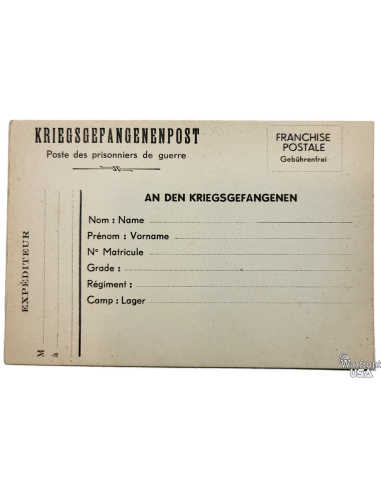"KRIEGSGEFANGENENPOST" ("Prisoner of War Mail"), clearly indicating its purpose.
"Poste des prisonniers de guerre. FRANCHISE POSTALE Gebührenfrei" ("Prisoner of War Mail. Free Postage" in French and German), showing that no postage was required for this correspondence, reflecting the international agreements on POW mail.
Sender Information:
Expéditeur (Sender):
Nom (Name)
Prénom (First Name)
Nº Matricule (Prisoner Number)
Grade (Rank)
Régiment (Regiment)
Camp (Lager - Camp)
"AN DEN KRIEGSGEFANGENEN" ("To the Prisoner of War"), suggesting this part might be filled out if the card was being sent to a POW rather than from one.
Nothing on the back: This indicates the card was either used solely for its intended purpose of identification and routing or that any message was written on the front where space permitted, under the strict conditions of POW correspondence.
These cards were vital for maintaining morale among POWs and their families, providing a lifeline of communication despite the harsh conditions of captivity. The dual-language text reflects the international nature of the conflict and the need to communicate across language barriers.
Historical Significance: An important collector's item for those interested in WWI, particularly the experiences of POWs, German military history, or the postal service during wartime.
Offers insight into the human side of war, the treatment of prisoners, and how communication was managed under the constraints of captivity.
Note: This postal card stands as a testament to the resilience of human connection in the face of adversity, encapsulating a moment in history where even the simplest act of sending a message was fraught with challenges and significance.





































